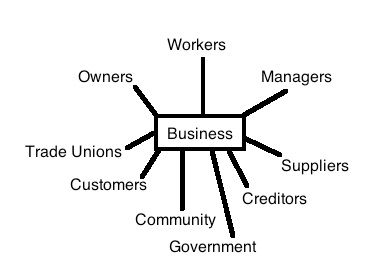A stakeholder is an individual, or any group or organization that has a concern or interest in a company or organization. Stakeholders are also those that are directly or indirectly affected by a business or project.
Businesses have different kinds of internal and external stakeholders with diverse priorities and interests.
Stakeholders can be people, organizations or groups that are affected by the activities of a business. Stakeholders are not necessarily the same as stockholders (simply shareholders).
Examples of stakeholders include:
- Owners – they are concerned about the business’ profits, among other things. In large companies shareholders are primary stakeholders.
- Managers – they are interested in their income and job prospects.
- Workers – like managers, they are also interested in their wages and how secure their jobs are.
- Trade unions – they are concerned about workers’ wages, benefits and conditions, as well as receiving their union fees (dues).
- Clients and customers – they want the best quality product or service at good prices. Customers are key stakeholders. Any business that chooses to ignore customer concerns risks losing to its competitors.
- Suppliers – they want to continue supplying the company.
- Creditors – they are interested in getting their money back.
- The local community – the company provides jobs, if there are factories there may be unpleasant consequences (smell, noise), it may want to expand onto green-designated land. Whatever the business plans to do, it will affect the local community.
- Government – it is interested in collecting taxes, grants, permits, etc.
In the list above, the internal stakeholders are the owners, managers, and workers, while the external stakeholders are the trade unions, clients, suppliers, creditors, local community and government.
 Those above the “Business” box are internal stakeholders and below are external stakeholders.
Those above the “Business” box are internal stakeholders and below are external stakeholders.
Stakeholders have different concerns
Stakeholders do not all have the same objectives. In their quest for higher profits the owners may not want to raise wages, something the workers seek. If improving a product is seen as too costly for the owners, this could go against the interests of the customer.
The term ‘stakeholder’ with this meaning was first used in 1963 at the Stamford Research Institute in an internal memorandum. The writer defined stakeholders as “those groups without whose support the organization would cease to exist.”
In smaller enterprises, the major or primary stakeholders are the owners, workers and customers. In large corporations, shareholders are the primary stakeholders, because they can vote out directors if they think they are not running the business properly.
